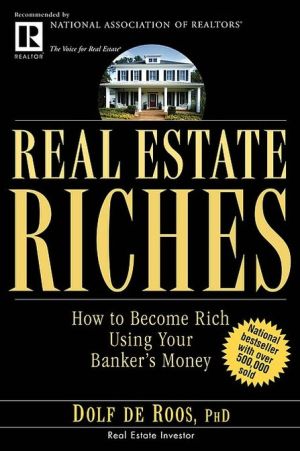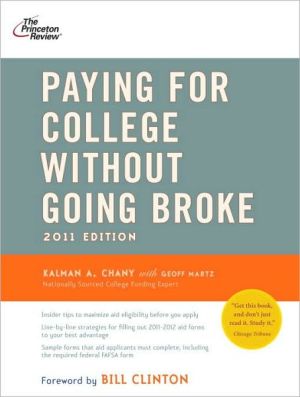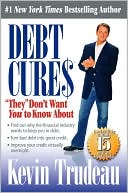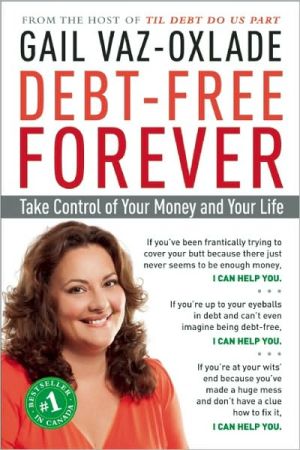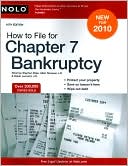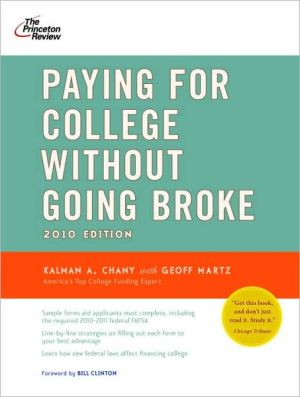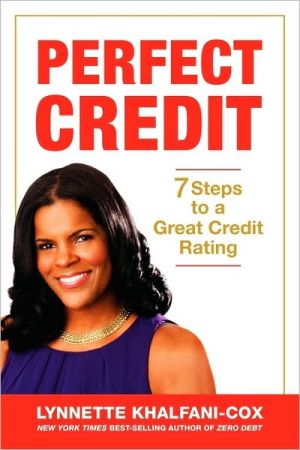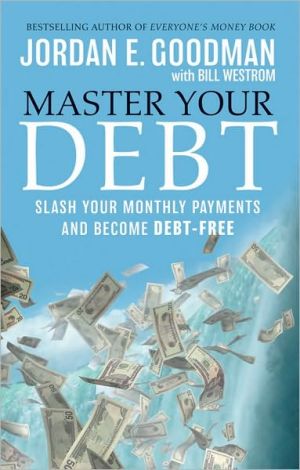Real Estate Riches: How to Become Rich Using Your Banker's Money
An all-time bestseller, Dolf de Roos's classic Real Estate Riches shows you how to find great deals and make great profits in the real estate market. You'll learn why real estate is such a reliable moneymaker and how to achieve the biggest return possible on your investment. Full of time-honored wisdom, proven tactics, and quick-and-easy tips, this book shows you how to find the best properties with the most potential, analyze deals, negotiate and submit offers, effectively manage properties,...
Search in google:
i>Real Estate Riches will:•Show you why real estate is tens and hundreds of times better than other investments•Train you to find the "Deal of the Decade" every week•Teach you how to massively increase the value of a property without spending much money•Explain how the tax man can subsidize your real estate
CHAPTER 1\ Four Magic Questions\ The purpose of this book is not so much to give you the "how-to" of real estate—although there will be plenty of how-to advice—but to make you sit bolt upright and exclaim: "Wow, I never realized real estate was this good!" The reason is that once you "get it," once you understand why property is such a phenomenally lucrative and astoundingly simple investment vehicle, you will never be able to focus on a sitcom on television again without getting itchy feet, wondering whether the hour wasted watching the tube is costing you the Deal of the Decade. You will be itching to apply my how-to ideas (and those gleaned from other books and sources), and you will also want to invent your own and go out there and try them, modify them, and continually improve them.\ I will show you that contrary to expectations and what we somehow seem to have been taught by our parents, relatives, schools, the mass media, and "experts," it is possible to find a bargain property, or even many of them in a row. It is possible to buy properties using mostly or entirely other people's money. It is possible to buy properties where the returns are 20 or 30 or 50 or 100 percent or more per annum. What's more, all these things are easy.\ When I tell people that property is not just as good as other investments, not just a little better, and not even just a lot better than other investments, but tens or even hundreds of times better than other investments, most people do not believe it.\ So, let me in the next few pages show you why I think property is so much better.\ Imagine you have a lump of money to invest. It does not matter whether you have $5,000, $10,000, $100,000, or $1 million, as the same principles apply in each case. So let's assume that you have $100,000 cash to invest. Let's also assume that you are considering investing your funds either in the stock market or in property. Finally, for the sake of simplicity, let's ignore all brokerage fees and commissions. I will simply pose four questions...\ Question One\ How many dollars' worth of stock can you buy with $100,000 cash?\ I often ask this question during seminars and am not infrequently met with a sea of blank faces, as if it were a trick question. It is not! For most people, when you have $100,000 of cash to invest in the stock market, you can buy exactly $100,000 worth of stock.\ Now I know some of you will protest that you can buy stocks on margin, but the reality is that investment houses will only let you do that with a very limited number of stocks, and then only for about 30 percent of the value of the stocks. What's more, if the stocks go down in value, they will make a "margin call," in other words, ordering you to pay a portion of the plummeted value so that your borrowing percentage is down to within their acceptable margins again. The truth is that for nearly all stock market investors, they put up the entire purchase price in cash.\ So, in nearly all cases, your $100,000 cash will buy you exactly $100,000 worth of stock.\ Let's compare this with investing in real estate.\ How many dollars' worth of property can you buy with $100,000 cash?\ Well, clearly, you could buy a $100,000 property. But you could also buy a $200,000 property, by taking out a mortgage for 50 percent of the property's purchase price. You could also buy a $300,000 property by taking out a 66 percent mortgage. In fact, you could buy a $1 million property by taking out a 90 percent mortgage.\ Now I know that for many of you the notion of buying $1 million worth of property with a mere $100,000 cash is way beyond your comfort zone, and into the fear territory of your minds. The figure of $1 million may be a bit daunting, and then you can't help but think that if you have a $900,000 mortgage, how on earth are you going to pay the interest on that? After all, at a nominal 8 percent interest per annum, that would amount to $72,000 per year in interest, which may be more than you are presently earning!\ The answer is that if you did buy a $1 million property with $100,000 cash, you would have an asset worth $1 million that would generate rental income for you. If you had bought wisely, then the rent would more than cover your expenses.\ The point is that when you buy stocks, you generally have to put up the entire purchase price in cash. When you buy property, you generally have banks and other lending institutions falling over themselves to give you money.\ People often challenge me on this claim that banks and financial institutionsfall over themselves to lend you money to buy property. They often cite difficulties they have had with such institutions, and use examples of these difficulties to counter my argument.\ They are totally missing the point. Anywhere in the world you can pick up a newspaper or magazine, look at television ads, or be confronted by huge billboards. You will never see advertisements saying things like: "Want to invest in diamonds, or antiques, or paintings, or precious metals, or stocks, or certificates of deposit (CDs), or mutual funds, or phone cards? Come and see us, and we will lend you the money to invest." It sounds crazy, right? Yet these same newspapers and magazines and television channels and billboards continually run advertisements offering financing for property acquisitions.\ Remember how when you buy a new (for you, anyway) car, you suddenly notice all the other cars of the same make and model on the road? Well, when you look out for advertisements of institutions looking to lend you money to buy property, you will suddenly see them all over the place. And then you will also notice the lack of ads offering financing for other investments.\ There is another way of looking at it. Imagine going into the bank, and saying to your bank manager something like: "I want to invest in gold, and my neighbor says that platinum is a good investment, and my kids are really into phone cards and baseball cards, and my husband (or wife) collects antiques, and we want to buy more stocks and bonds, so will you please, Mr. Bank Manager, lend us the money to invest in these things?" Chances are he will laugh you out of his office. And yet if you were to ask that same bank manager for money to buy property, he will look at the situation with interest, as he is generally eager to lend money on property.\ This tells you two things about property. First, it is still considered a safe and secure investment. As further proof of this, consider the interest rates charged on various loans. The interest rate charged on real estate loans is less than that charged on business loans, which in turn is less than that typically charged on credit card balances. Clearly, banks exact higher interest rates where the perceived risk is higher.\ Second, the important thing to note from the observation that bank managers happily lend money on property (but almost nothing else) is that when you acquire property, you don't even need most of the money required for the purchase! What a dream situation! Think about this for a moment. Banks have the money (oodles of it!) but fortunately do not want to buy property (otherwise what would stop them from buying it all themselves?). And you want to buy property, but don't have (all of ) the money. What a great opportunity for synergy!\ This brings us full circle: With $100,000 cash, you can generally buy $100,000 worth of stocks, whereas that same $100,000 cash can buy you $1 million worth of property.\ The advantage of this leverage is self-evident. If both stocks and properties went up by, say, 10 percent, then your stocks would have gone to $110,000 (a profit of $10,000), meaning that you would have made a 10 percent return on your invested capital. Your property would similarly have gone from $1 million to $1.1 million (a profit of $100,000), meaning that you would have made 100 percent return on your invested capital.\ Of course leverage works in both directions. If everything goes down by 10 percent, then the stockholder would only lose 10 percent of his invested capital, whereas the property investor would lose all of it. However, I will show in the next chapter why I am not overly concerned with this risk of a downturn.\ Question Two\ The moment you buy your $100,000 worth of stock using your $100,000 cash, how much is your stock worth?\ If Question 1 (from a few pages back) as it relates to stocks draws blank stares during seminars, Question 2 creates discomfort, as most people seem to assume that this time it must really be a trick question. Once more it is not!\ By definition, at any point in time, a stock is worth that price at which willing buyers and willing sellers agree to transact a parcel of shares. Even though there may be many tens of thousands of existing stockholders who could be either potential sellers or buyers, and an even larger body of people who could be potential buyers, all of whom may have wildly varying ideas as to what the stock is worth, the market is structured so that at any given time, there is only one valid market price for that stock. Any and all transactions are effected at that one same price until, through the forces of supply and demand, the one price moves to a different level. In other words, at any one time, there is one, and only one, market price for that stock.\ Thus, the moment you buy $100,000 worth of stock using your $100,000 cash, it is worth exactly $100,000.\ The moment you buy your $1 million property using your $100,000 cash and a mortgage of $900,000, how much is your property worth?\ Answers to this question tend to be somewhat guarded, but from an audience there is generally a muted consensus that the property is worth $1 million the moment you buy it.\ Well, let me just toss some ideas your way...\ Is it not possible that the property for which you just paid $1 million using your $100,000 cash and a mortgage of $900,000 is only worth $650,000, and that some fast-talking owner or agent talked you into paying too much for it? Is it not possible that you bought a lemon?\ Of course it is! It happens all the time. Just as people can pay too much for a used car, only to find out later that there is the proverbial sawdust (or banana skin) in the gear box, and just as you can talk yourself into believing that a painting is a steal because you think it is a Rembrandt, only to discover later that it truly was stolen, or that it was a bad copy and therefore not worth 10 percent of what you paid, so too can you pay too much for a property.\ By the same token, is it not possible that the property for which you just paid $1 million using your $100,000 cash and a mortgage of $900,000 is worth $1.5 million, and that some slow-thinking owner or agent let you get away with paying too little for it? Is it not possible that you bought a phenomenal bargain?\ Of course it is! It happens all the time. Just as people will sell you a car incredibly cheaply because "we are leaving town tomorrow and just want to cross it off our list," and just as you can get a painting for a song because the owners inherited it and never liked it in the first place and didn't think it was worth much, and you then find out it is a master after all, so too can you get a property for what seems like a steal.\ It happens every day of the week. In fact, it is much easier to buy a bargain than a lemon for the simple reason that even if you sign a contract (subject to finance) to buy a lemon, the bank will not lend you money on it, as the appraisal will reflect its true value and not the contract price. Bingo! An instant and invisible lemon-avoidance algorithm.\ Now I know from experience that when I say "It happens all the time!" many people need more convincing. After all, they say, if it happens all the time, why has it never happened to me?\ Well, the problem is that too many people think that if something sounds too good to be true, then it must be. If that is your belief, if that is what you have been brought up to think, then every time you come across something that sounds too good to be true (like a building worth $1.5 million that is on the market for $1 million), you will dismiss it as a hoax, as a con, or as a fiction of someone's imagination, and you will move on to more "believable" deals.\ Therefore, you will limit yourself to deals of mediocrity, to the plain vanilla, ordinary, so-so deals with little upside potential that most of the rest of the world languishes with.\ Does this mean that all deals that sound phenomenal are in fact phenomenal? Of course not! But dismissing them out of hand merely because they sound good definitely means limiting yourself to those horrid deals of mediocrity.\ Even if you accept that phenomenal deals may exist, you may still be wondering why anyone in their right mind would sell a building worth $1.5 million for a mere $1 million. There are too many reasons to list here, but let me give you some examples...\ The most common reason why properties are sold at way below their true value is, unfortunately, divorce. When people are blissfully married they can reason lovingly and at length, but when things go awry, the battlers want instant results. So if it is agreed to sell a jointly owned home, the owners generally want each other out of their hair as soon as possible, and they therefore want their money out fast. There is no time to prepare the property for a good sale, and sometimes even no time to get an updated appraisal. Let's just sell the property NOW, split the proceeds, and never talk to each other again.\ Not getting an appraisal is a surprisingly frequent reason why properties are sold at way below the market value. One example is when people are in a hurry, such as in a divorce situation as we have just seen. Other times, the owner may think he knows it all anyway, and since the house up the street sold for $360,000, and the house down the street sold for $345,000, he feels he is getting a good deal by selling his at $370,000, when in fact any of a dozen appraisers would have put a value of $480,000 on his property since his is the only one with a triple garage, a swimming pool, and a view to die for.\ Sometimes the owners are simply too stingy to engage the services of an appraiser. They think that by saving the appraisal fee (typically around $500 for a single residence), they are putting that money in their pocket, when in actual fact they may be depriving themselves of many tens of thousands of dollars of potential sale price.\ Perhaps the owners have lived in the house since 1957, when they bought the property for $3,200, and they now think they are ripping you off by accepting $285,000 for it, when in actual fact the property is genuinely worth $390,000.\ Or a property may have been bequeathed to four children. One of them wants to live in it, the second wants to rent it out, the third wants to turn it into a commune, and the fourth is hiking in Nepal and cannot be contacted. General disharmony ensues, and in the end the lawyers (including the one with the power of attorney for the hiker) arrange to sell the property quickly and split the proceeds four ways.\ Very commonly a property may be sold by people who have no vested interest in getting the true market value for it. This is often the case with foreclosure situations, where the bank is mainly interested in getting its mortgage back, but also occurs when people are asked to look after someone else's affairs. For instance, young Tommy may be asked to go back East to sell dearly departed Grandpa's house and small shopping mall, because no one else in the family can take the time off work. However, the reason Tommy doesn't have a job is because he likes partying, so back East he does not bother to do his homework to get the best price-he assigns the task to a randomly chosen real estate agent (a rookie with two weeks' experience), and both Tommy and the agent are ecstatic to get a sale price of $1 million, when the true value was, you guessed it, $1.5 million.\ Each reason why people sell a property at well below its market value is unique, but they are there nonetheless. Believe it, and you will find them. Do not believe it, and you can join the masses who can say with complete honesty and accuracy that "that sort of thing never happens to me!"\ So far, we have asked two of our four magic questions. We have seen that when you invest $100,000 in the stock market, you get exactly $100,000 worth of stocks that are worth exactly $100,000 the moment you buy them. Conversely, when you invest $100,000 in property, you can buy $1.5 million worth of property for a contracted price of $1 million using a $900,000 mortgage. Let's move on to the third question.\ Question Three\ When you buy your $100,000 worth of stock for a purchase price of $100,000 (and the moment you buy it, it is in fact worth exactly $100,000), what can you personally do to increase the value of your stock portfolio?\ "Pray!" I hear you say. How about writing a letter to the directors of the company wishing them well? Or how about going out and buying as much and as many of the products or services that the company provides as you can afford?\ I think you will agree that your options are limited.\ When you buy your $1.5 million property for a contract price of $1 million using your $100,000 cash and a mortgage of $900,000, what can you personally do to increase the value of your property?\ Wow! Where do we start?\ You could paint the property. If you do not believe that it is possible to buy a property for $60,000, have it painted, and then sell it for $80,000, then you are missing out on spectacular opportunities.\ Wait a minute, you say, let's slow up a bit! Why would anyone be willing to pay $80,000 for a painted house, but not $60,000 for one in dire need of a $400 paint job?\ The answer lies in the way we have been conditioned to expect instant results. We want, expect, and can generally get instant soup, instant coffee, instant passport photos, instant credit card application approvals, instant messaging, Jiffy Lubes, and Curry in a Hurry.\ So when the masses go looking at properties, and they see an old house with bare wood exposed on the siding, they tend to dismiss it as being a rotten old property that will require a lot of work and effort (it probably has many things wrong with it besides the condition of the paint)—definitely no instant gratification! Most people would rather rot in front of the television set than pick up a paintbrush and paint a $20,000 profit for themselves in a couple of days (or better yet, pay someone to paint it for them for a modest $10, $20, or, who cares, even $50 an hour while they spend the time saved looking for the next $20,000 profit).\ Magically, when that same house is painted, the masses will see it as a cute cottage in excellent condition that they could move into instantly, that would be a delight to live in, and that they could (instantly!) show off to their friends. Perception is reality!\ Well, so much for our first idea on how you could increase the value of your investment in property. There are many other ideas... You may increase the value of your property by replacing the rusted gutters and downspouts on the front, by putting in a new heating/cooling system, by changing the curtains or drapes, by modernizing the bathroom, by putting in a new kitchen, by painting the roof, by erecting or replacing a fence, by installing an alarm system, by fitting new doorknobs throughout, by changing the window shades, by adding a swimming pool, by removing an old shed, by cleaning the carpets, or by paving the driveway.\ On commercial properties you can increase the value by finding a tenant for a vacant space, by splitting a large area that may be worth only $5 per square foot and for which you have no tenants into two smaller areas worth $7 per square foot and for which you can easily get tenants, by (again) painting it, by agreeing to a longer lease length, by attracting a better tenant, or by replacing the carpets.\ There are literally 101 things you can do to massively increase the value of your property without spending much money. In fact, to prove it, I have written a book detailing just that (see Appendix). We will explore some of these ideas in more detail later in this book.\ But for now, let's get back to the point. Whereas with most other investments there is little you can do to increase the value of the investment, with property you are only limited by your imagination.\ This brings us to our fourth and final question for this section... Part of the reason why we invest is in the anticipation that things will go up in value. So, let's assume that all invested assets have doubled in value. (I am not specifying a time frame here-it may happen in a year or over a period of many years.) That means that the $100,000 stock portfolio has doubled to $200,000, and that the $1.5 million property has doubled to $3 million.\ Question Four\ You bought $100,000 worth of stock with $100,000 cash that was worth $100,000 the moment you bought it. It has doubled in value to $200,000. What must you do to enjoy some of the increased value?\ Well, for most investors, the simple answer is: "Sell!" You could sell the entire portfolio, and thereby get your original $100,000 investment back plus $100,000 profit, or you could sell a portion of it. Either way, depending on the tax jurisdiction you are in, you will be up for capital gains tax, which will take some of the wind out of your windfall. What's more, by selling part of the portfolio, you are reducing the amount that is left that can earn further profits for you. Something sounds counter productive!\ You bought $1.5 million worth of property for a contract price of $1 million using $100,000 cash and a mortgage of $900,000. It has doubled in value to $3 million. What must you do to enjoy some of the profit?\ By now you have probably learned to expect something other than the pat answer: "Sell it!" And you'd be right. Selling the property would be the dumbest thing you could do! Why sell it? After all, you own an asset, the value of which is indexed for inflation. It is generating a passive rental income that is similarly indexed for inflation. As time goes on, both the value of the property and the income it generates will continue to creep up. What's more, if you were silly enough to sell, you may have to pay capital gains tax on the profit.\ But, I can hear some of you say, if you don't sell, how will you ever access the increase in value?\ The answer is simply to refinance. You get a new appraisal (this time for $3 million) and go back to the bank and ask for a new mortgage. At the 90 percent loan-value ratio, you would get $2.7 million in your hands. After paying off the original $900,000 mortgage, you would still have $1.8 million left over of surplus new cash in your hands.\ And ask yourself this question: Is the $1.8 million taxable? Of course not! Why would it be taxable? It is not income, so there would be no income tax due. Similarly, you have not sold the property, so there can be no talk of a capital gains tax.\ You could use this $1.8 million as a 10 percent deposit on a further $18 million worth of property, which, combined with the $3 million you already own, makes your total portfolio worth $21 million.\ At this stage, if property values were to go up a mere 1 percent, you would have made $210,000 (1 percent of $21 million). And the surplus passive rental income cash flow would be very handsome. If the property were to go up by 10 percent (perhaps in one year, or perhaps over a period of, say, five years), then you would have made a further $2.1 million (10 percent of $21 million). At this stage you could again re-finance, pull some more money out, and invest in more property, or you could buy anything else such as an airplane (tax-deductible if you use it to fly around inspecting your expanding empire).\ This airplane raises an interesting point... In his book Rich Dad Poor Dad, Robert Kiyosaki explains how the poor earn their money, pay tax on it, and then spend what's left on the things they want. On the other hand, the rich earn money, spend it on the things they want, and then pay tax on what is left. Well, the property investor has an added benefit:\ When he refinances a property, first he receives money for which he has expended no effort (as in exchanging time for money), then, there are no tax obligations attached. Next, he gets to use this tax-free money to buy the things he wants (in this example an airplane). Furthermore, he gets a tax benefit from the interest payment on the money that he didn't even have to earn but simply got from the bank. Finally, he can depreciate the asset to give a further tax benefit. All aboard please!\ But I am getting ahead of myself.\ My aim in writing this chapter is to share with you why I think property is not just as good as other investments, not just a little bit better than other investments, and not even just much better than other investments, but tens and even hundreds of times better than other investments.\ My belief is that whereas most other investments do not offer significant leverage, property offers tremendous leverage through the generous application of mortgage financing. What's more, unlike with other investments, you can often buy properties at prices significantly below their true value, you can do things to them to further increase their value way beyond the cost of the improvement, and you do not need to sell to reap huge benefits from the increase in value.\ Taken one at a time, the advantages just mentioned make real estate a phenomenally powerful investment vehicle. However, when considered in unison, when these advantages work together, the effects compound each other, and, as we have seen, an investment of a mere $100,000 may give you access to $18 million without much effort at all. Even if it were only half as good, the resulting $9 million would still be phenomenal! Even if it were only one tenth as good, the $1.8 million would still be spectacular! Even if it were only one hundredth as good ($180,000), that is still, in my biased view, wildly better than the results of investing the same original starting capital of $100,000 in something that does not offer the advantages discussed in this chapter.\ Now I have no illusions: For every argument and example I present in this book, there will be scores of detractors who will cry foul. They will seize specific clauses, phrases, sentences, and passages, and quote them in such a way to try to convince themselves or their audience that what I am saying cannot be right. They will say things like: "Where I come from you certainly cannot get 90 percent mortgages!" or "You cannot make $20,000 profit by spending $400 on paint and throwing in a weekend of labor in my town! Deals like that don't exist here."\ If you choose to agree with them, that is fine by me! I will address the doom-and-gloom merchants, naysayers, disbelievers, and detractors later in this book. For now, please accept that what I have described here is my reality.\ My contention is that most detractors of property do not fairly compare property with other investments. Consciously or subconsciously, they distort the truth, and then end up believing this distorted perception themselves. So, it is time to explore the benchmark used to compare most investments. You can then decide for yourself what is accurate and what is not.\ Copyright (c) 2001 by Dolf de Roos, Ph.D.
ForewordviiPraise for Real Estate RichesixAcknowledgmentsxiiiPreface: I Don't Have a Job. Shame!xvPart 1Why Is Property So Good?1Chapter 1Four Magic Questions3Chapter 2Conspiracy Theory19Chapter 3A Taxing Issue27Chapter 4Beating the Averages Easily33Chapter 5Yes, But...63Chapter 6Summary: Why Invest in Real Estate?69Part 2Okay! Show Me How to Do It!71Chapter 7The 100:10:3:1 Rule73Chapter 8Finding Properties81Chapter 9Analyzing Deals101Chapter 10Negotiations and Submitting Offers109Chapter 11Getting High on Opium (aka OPM)119Chapter 12Massively Increase the Value of Your Properties (Without Spending Much Money)129Chapter 13Managing Your Properties137Part 3Liftoff!149Chapter 14Residential versus Commercial Property151Chapter 15Government Interference169Chapter 16The Eight Golden Rules of Property173Chapter 17The World Is Your Oyster181AppendixOther Books by Dolf de Roos187About the Author189Index191
